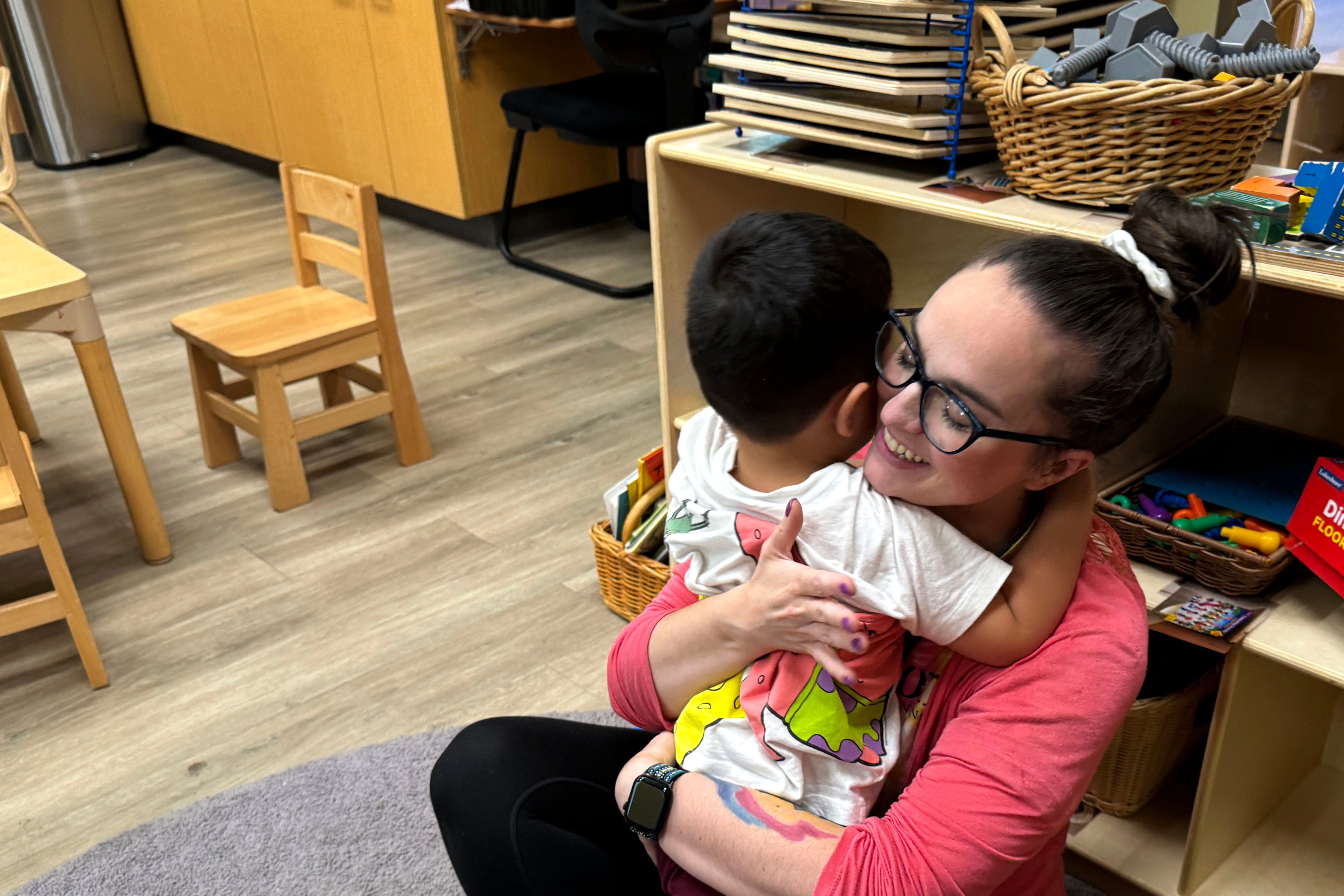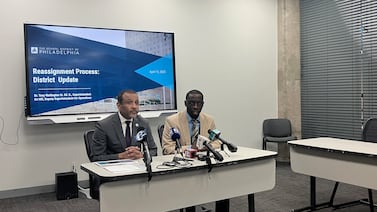Stay up-to-date on the latest news in early childhood education and development across the U.S. Sign up for Chalkbeat’s free monthly newsletter The Starting Line.
One minute, the 4-year-old boy was giggling. The school’s new behavioral specialist made a game of helping him put on his shoes, playfully sniffing them then scrunching up her face in pretend horror.
A minute later, he was inconsolable, an emotional U-turn perhaps sparked by the transition to clean-up time. A teacher cradled the boy in her lap, calmly dodging his small flailing arms. He quieted when he got his pacifier and the shield of a cozy blanket over his head.
Such scenes — of young children struggling to cope — have become more commonplace in Colorado and nationwide as a generation of babies and toddlers whose early life was marked by the pandemic now enter preschool and kindergarten. Experts say many of these children carry more emotional baggage than their predecessors, owing to the stress that coursed through families as isolation, unemployment, sickness, and grief took their toll.
“Any child who was impacted by the pandemic during their first three years of life is bound to have something lingering,” said Karen Wolf, mental health manager at Clayton Early Learning in Denver, where the boy cried under the blanket.
More of Colorado’s pandemic babies and toddlers are showing up with developmental delays than their counterparts born just a few years before. In 2019, about 9,000 children from birth to 3 years old were eligible for free state services because of development delays. By 2023, that number jumped 17% to about 10,600.
There’s also a group of young children who don’t have official delays, but missed out on basic social skills when preschool and playdates stopped during the pandemic. Preschool enrollment in Colorado’s public schools dropped by more than 20% during the 2020-21 school year compared with the year before, according to the Colorado Department of Education.
Early educators say they’re seeing more children who struggle with speech, communication, and managing their emotions than in years past. More students also now struggle with classroom expectations. Jennifer Lussier, a kindergarten teacher at Coyote Ridge Elementary in Broomfield, said a couple years into the pandemic she experienced an unfortunate first: A kindergartner told her, “I’m not doing that. That’s stupid.”
Some teachers and advocates say it’s hard to untangle the effects of COVID from other factors, such as children’s frequent use of smartphones and tablets — a phenomenon exacerbated by the pandemic.
Many schools and child care centers are working to meet students’ extra needs. They’ve added more teacher training or hired new staff to work with children who hit, bite, or have tantrums. They devote more class time to social-emotional skills and call in mental health specialists when big problems erupt.
But some worry that chronic industry problems, including a shortage of therapists who work with young children, high turnover among early childhood educators, and a lack of funding for the field at large, are stunting recovery efforts.
The demands on preschool teachers and daycare workers have grown even as their resources have shrunk, said Lori Ganz, clinical director of The Resource Exchange, which provides early childhood services in El Paso County and nearby counties.
“Their classrooms are larger and the children are more challenging,” Ganz said, “and some days they just can’t do it.”
New parents in pandemic faced an uncertain world
Chmura Smith was in her last semester of community college when the pandemic hit. She was also pregnant with her first child.
“The pandemic kind of shut down my whole life,” she said.
Classes moved online, a format Smith didn’t like. She remembers a chronic feeling of uncertainty. She worried about “getting COVID and it never going away and always being in lockdown.”
A few days after her May graduation, she went into labor much too early. Her son Jadon was just two pounds and two ounces when he was born. He came home healthy after two months in the hospital, but as he grew, he struggled to pronounce words and would sometimes stutter. He’ll say things like “Gween Gwoblin” when talking about his favorite Spider-Man villain.
Jadon, now 4, has a special education plan and gets speech therapy at Clayton Early Learning, where he attends preschool. His 3-year-old brother, born full-term as the world was opening back up in 2021, never had any speech problems.

For Smith, it’s hard to pinpoint the reason for Jadon’s speech delay. She said her own stress during the pandemic could have sparked his premature birth, which in turn could have contributed to his speech problems.
“That year was a lot,” she said.
Erin and JK Perry, who live in the western Colorado town of Eagle, also wonder about the effects of the pandemic on their 4-year-old son. In so many ways, he’s thriving. He’s an outgoing child with a big vocabulary and good friends.
But he also struggles with anxiety at times — for example, if his parents switch off who’s bringing him to preschool without telling him.
“He will yell. He will refuse to eat his breakfast. He will refuse to put his shoes on,” Erin Perry said.
“I feel like some of that could have been me and JK and just the levels of anxiety we were dealing with,” she said. “It wasn’t just being new parents. It was being new parents in a pandemic. It was like being scared to go to the grocery store.”
Erin Perry said teachers at their son’s child care center talked of behavior post-COVID that they’d never seen before. When their son was 2, one teacher was responsible for shadowing a toddler in the class who continuously acted out. When that teacher turned her back momentarily, the toddler bit their son hard enough to draw blood, she said.
Fewer young children flagged for extra help
During the first year of the pandemic, thousands of babies and toddlers with delays or disabilities missed out on services that would have helped them catch up. They weren’t going to the routine doctor appointments or to child care where professionals might have noticed an issue and referred them for a free state evaluation.
In addition, Colorado temporarily raised the bar in 2020 for the level of delay children needed to receive early intervention services because of a budget shortfall. A version of the earlier threshold was reinstated in 2023.
To make matters worse, early intervention services switched to virtual as the pandemic raged. Some families opted out all together, while others tried them but struggled to realize the benefits. A lag in getting kids set up with therapies and other services can compound their problems, experts say.
Lussier, the kindergarten teacher in Broomfield, said before the pandemic she typically had one or two children with delays in her classroom, but now it’s often double that.
She recalled a boy in her class last year who spoke only in short phrases like, “Bathroom, bathroom. I use bathroom.” Once, she told the boy, “Put your name on your paper.” He looked at her in bewilderment. He didn’t understand that she was asking him to write his name.
A nationwide study conducted by Johns Hopkins University researchers and published this year found modest decreases in screening scores for three developmental areas for children from birth to age 5 during the first two years of the pandemic compared with children the same age before the pandemic. They include communication, problem-solving and personal-social, which includes skills like feeding and dressing.
Researchers said the findings were generally reassuring in the short term and “suggest reason for cautious optimism.” But they warned that more kids with delays could tax the already overburdened system. They noted that the additional deficits translate to about 1,500 more children nationwide being referred for developmental delay evaluations each month.
Classrooms problems aren’t always due to developmental delays
Early educators and mental health specialists say there’s also a growing group of young children who don’t have developmental delays or disabilities, but struggle with classroom norms.
Early in the pandemic, when fewer kids attended child care and preschool — and many adults were constantly sanitizing — some children missed out on the sights, sounds, and textures of a normal classroom: The jumble of classmates finger-painting, playing in sandboxes, and shaping Play-Doh.
When children eventually did experience those things for the first time, it was often overwhelming.
“A typical scenario is a kid who’s pushing and shoving the kids in the line, and it’s because they can’t handle the sensation of touch with other people close to them because they’ve not experienced that before,” said Ganz, of The Resource Center.
Anna Clark, a kindergarten teacher in Cottonwood Elementary in the western Colorado city of Montrose, used to take out a box of fidget toys occasionally when a child needed a calming activity. Now, the box is always out because so many children need sensory breaks.
Taryn Long, who evaluates children ages 3 to 5 to see if they qualify for special education services in the Brighton-based District 27J, said since the pandemic, more children are being referred for evaluations because of “behavior.” Perhaps they pushed a classmate at child care, hit a teacher, or had a meltdown.
“They’re getting kicked out left and right. All sorts of write-ups,” said Long.
But often such children don’t qualify for special education because they are doing fairly well in some ways, she said. They can follow directions, answer questions, and know colors or parts of the body, for example.
Long, and other professionals who work with young children, say some of the struggles young kids have experienced are because in the thick of the pandemic they didn’t have regular interactions with other children and were on screens more than ever.
Parents told Long, “We couldn’t go to the park. The park was taped off. All they had was us.”
Clark, echoing concerns raised by other educators, believes constant stimuli from screens has made it harder for children to enjoy simple things, partake in imaginative play, and even hone their fine motor skills.
With all the one-finger swiping, she said, “They’re not pinching their fingers to turn pages in a book or a magazine as often, and so it kind of just all escalates into these deficits we’ve been seeing.”
Educators say children’s development ‘not a lost cause’
Some early educators say young children today need more practice and more time to pick up key social and emotional skills they would typically learn before kindergarten. Even with early setbacks, children are adaptable and resilient.
“It’s a magical time,” said Wolf, of Clayton Early Learning. “We can have so much good impact still. It’s not a lost cause.”
Earlier this summer, Clayton hired its new behavior specialist — a roving teacher with a background in special education — to help the growing number of preschoolers with challenging behavior. She’s the one who made a silly game of putting on the boy’s shoes.
Last year, Lussier, the kindergarten teacher in Broomfield, spent eight weeks early in the year on lessons and stories about feelings and friendships, not the usual six. She also started going over the rules of afternoon play time, like not grabbing things out of people’s hands, every day.
In the Eagle County school district, all 98 preschool teachers and assistant teachers will receive training this year on how to manage children with the most extreme behaviors — a change from the “as-needed” approach of years past.
Feedback from annual staff surveys prompted the added training, said Shelley Smith, the district’s director of early childhood programs: “It always is a need, but it grew significantly, from ‘I need more resources’ to ‘I don’t feel safe. I can’t keep the other children safe.’”
Several local early childhood leaders said they need more funding for early childhood mental health consultants, specialists who work with parents and teachers to prevent and manage challenging behavior in children.
Ganz, of the Resource Exchange, said the demand for such services far outstrips supply. Her program provides early intervention and early childhood mental health consultation to about 1,200 children at any given time in El Paso County and three nearby counties.
Her mental health consultant budget was recently cut by $300,000 after federal COVID relief funds dried up. Her program turns away five or six callers a week who want mental health consultations, she said
“Now is exactly when those children need the help,” she said. If they land on a waiting list, “we miss a window of opportunity, because for a child, six months is a very long time.”
Asked how much money she’d need to fully staff her early intervention and mental health consultant programs, she said, “We can use a magic wand of a million dollars.”
Ann Schimke is a senior reporter at Chalkbeat, covering early childhood issues and early literacy. Contact Ann at aschimke@chalkbeat.org.







